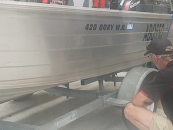FOR BOAT OWNERS
As a boat owner, employing the right contractor to undertake work on your vessel is an important decision. You are not only entrusting this person with your boat while the work is being done, but you will likely also be paying large sums of money.
1. Expectations and budget
Owning a boat requires consistent investment of time and money; there is no use in pretending otherwise. From time to time, it also means bringing in professional maintenance services, such as anti-fouling, painting, or engine maintenance. It is important that you are able to trust that the work will be performed to industry and legal standards, and be provided at a cost you can afford. The key is communication.
It is important that you:
a. Outline the scope of work that you want completed on your boat; b. Provide any important information to the contractor that may affect the work; Obtain a quote for the entirety of the work; c. Agree on the cost of any variations to the scope of work; d. Understand any terms and conditions of the contractor; and e. Record all of the above in writing.
Logically, a contract is the usual form for recording. One cannot understate the importance of a written contract between a boat owner and service provider.
Many businesses will have standard terms and conditions (T&C). These are almost always incorporated into the contract for any work or service, and it is important that you read these T&C. If there are any terms that you are not comfortable with, talk with the service provider about these, and seek legal advice.
2. Legislative protections
Australian Consumer Law guarantees apply to the supply of services. They further apply whether there is a contract or not. These laws are intended to protect the consumer. A breach of any of these guarantees allows for a legal claim to be made. These protections apply to services that cost less than $40,000; or, to services that cost more than $40,000, but are normally bought for personal or household use.
3. Unsatisfactory work
You return to the boat yard, get a final look at your boat, and discover that the work is … well not what you expected. What can you do?
The first step should always be to put your concerns in writing to the business. Perhaps there has been a misunderstanding, or complications that simply need to be discussed. When it becomes apparent that the chances of conciliation are minimal – for instance, the parties have not come to an agreement – more formal steps might need to be taken.
If the disputed work is valued at LESS than $25,000, then you can pursue the claim, at minimal costs, through the Queensland Civil and Administrative Tribunal (QCAT). Anyone can file claims with QCAT. Legal representation is not required; thus, costs can be kept to a minimum.
If the disputed work is valued at MORE than $25,000, then the claim must instead be referred to the court. In this case, it is a good idea to seek legal advice before commencing a claim in court.
FOR SERVICE PROVIDERS/CONTRACTORS
No matter the size of your business – big or small – it is important that you protect yourself.
1. Standard terms and conditions
The first and simplest step you can take to protect yourself and your business is to begin using standard terms and conditions (T&C). The T&C will apply to every future contract. These will also form the rules by which you conduct your business.
It is valuable to consult a lawyer when drafting the T&C. Every business is different, so it is important that the T&C are drafted specifically for your business. Additionally, the T&C must properly protect your business, comply with the federal and state laws, and industry regulations.
For example, the Australian Consumer Law legislation provides that a term or condition that is determined to be unfair will be treated as though it does not exist. An unfair term is one that:
1. Causes a significant imbalance in the parties’ rights under the contract; 2. Is not reasonably necessary to protect the party; and, 3. Would cause detriment to a party if it were applied or relied on.
If a court finds that your exclusion liability term is unfair, it will be ignored. Further, all intended exclusions of liability in that term of the contract will not apply. Thus, it is important to understand the T&C and their implications.
The T&C will be incorporated in all transactions. This may take place through a reference to where they are located on your website, or perhaps by printing them on the back of quotes, contracts and invoices. By properly incorporating valid and fair T&C, you can rely on them to protect your business in case of any dispute.
2. Legislative obligations
Businesses are able to enforce their own T&C and contracts. However, the Australian Consumer Law provides certain protections for consumers; in this case, the boat-owner. These protections translate to obligations on businesses that provide the services. If a service does not abide by these obligations then the boat owner will have a legal claim. Such legal claims may provide a right to repair, replacement, refund, cancellation, or compensation. Importantly, the obligations imposed by the Australian Consumer Law cannot be excluded by any contract or standard T&C.
There is specific legislation that applies to certain boats. For example, work conducted for Domestic Commercial Vessels (DCV) must be in accordance with all legislation, regulations, codes, and standards. This means that the legislative obligations on businesses are extensive. To disregard these obligations – naively or knowingly – could land you with a legal claim.
3. Unpaid invoices
You have completed the work as agreed. You return the boat to the smiling owner and email an invoice for payment. However, it is becoming apparent that the payment is not forthcoming. What are your options?
Always start with a conversation. There might be a valid reason why the invoice remains outstanding; for example, the invoice might have been filtered into the junk email folder, etc. However, if there is no good or valid reason, you have to make your demand in writing, providing a specific date for payment, and invite a discussion on how the repayment can take place.
Where it becomes clear that a formal approach is required, you may pursue a claim for an unpaid invoice for up to $25,000 with the QCAT. Where the invoiced sum is greater than $25,000, it is recommended that you consult a lawyer. While resorting to the courts may appear to be an attractive option, it is often better to negotiate for a compromise, rather than pursue a legal claim through court particularly for smaller amounts.
By Kendall Messer, Law Graduate (Pacific Maritime Lawyers & Consultants)



























